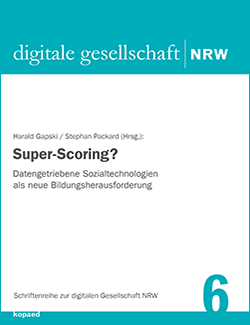Book Publication
This German documentation contains the presentations shown at the interdisciplinary symposium “Super-Scoring? Data-driven societal technologies in China and Western-style democracies as a new challenge for education”, which took place at Cologne, Germany, on October 11th, 2019.

All presentations of the conference as well as the short interviews are now available as an Open Access Gold publication in German translation under the title „Super-Scoring? Datengetriebene Sozialtechnologien in China und westlichen Demokratien als neue Bildungsherausforderung“. The book has been published by kopaed as volume 6 of the “Schriftenreihe zur digitalen Gesellschaft NRW”. All contributions in the volume are licensed under CC-BY-SA. The publication and the series are sponsored by the state government of North Rhine-Westphalia.
The volume is available for download:
Conference Documentation
Section I: Social Credit System in China (case study)
I.1 Evolution of the Social Credit System: A Public Law Perspective –
Yongxi Chen (Hong Kong University) (speaker´s essay)
I.2 Beyond “Digital Big Brother”: Five things to understand about China´s Social Scoring System –
Mareike Ohlberg (Mercator Institute for China Studies, MERICS, Berlin)
I.3 Blacklists and Social Credit Regimes in China
Larry Catá Backer (Pennsylvania State University) (speaker´s essay)
Section II: Scoring-Practices in Western-style democracies (case studies)
II.1 Scoring is not a new phenomena: we can learn from experience how to deal with scoring –
Gert G. Wagner (Max Planck Institute for Human Development, MPIB, Berlin) (speaker´s essay) (7 Fragen an Gert G. Wagner)
II.2 Personal Scoring in the EU: Not quite Black Mirror yet, at least if you‘re rich –
Nicolas Kayser-Bril (AlgorithmWatch, Berlin) (speaker´s essay) (7 questions to Nicolas Kayser-Bril)
II.3 Data Scores as Governance: Mapping and Analysing Changing Practices in the UK –
Joanna Redden (Cardiff University) (speaker´s essay)
Section III: Interdisciplinary discussion and evaluation of individual and social consequences
III.1 Shared responsibilities? The future of scoring in the context of shifting baselines and public science –
Stefan Selke (Furtwangen University) (speaker´s essay)
III.2 On the function and legitimation of scoring –
Lorena Jaume-Palasí (The Ethical Tech Society)
III.3 Identity and Integrity: The Ethical Relevance of Super-Scores –
Christiane Woopen (CERES; University of Cologne) (7 Fragen an Christiane Woopen)
Section IV: Educational conclusions and recommendation
IV.1 Ethical Aspects of Algorithms and Scoring in Pedagogical and Social Work Contexts –
Nadia Kutscher(University of Cologne) (speaker´s essay)
IV.2 Being scored but informed – how to boost people´s risk literacy for public discourse –
Felix G. Rebitschek (Harding Center for Risk Literacy) (speaker´s essay) (7 Fragen an Felix G. Rebitschek)
IV.3 Scoring practices – consequences for education in democratic societies –
Isabel Zorn (TH Köln – University of Applied Sciences) (speaker´s essay)